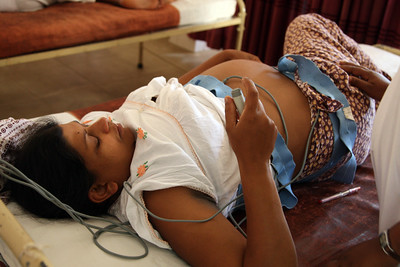Iodine supplementation for women may reduce the likelihood of postpartum hypothyroidism by 68% and decreases perinatal mortality by 34%.


Photos by: Simone D. McCourtie
Why is iodine supplementation for women important?
- Nearly 2 billion people worldwide are at risk of iodine deficiency which is essential for the body to produce thyroid hormones, specifically used for the growth and development of a foetus during pregnancy. Many expert medical groups recommend the use of iodine supplments during and after pregnancy to ensure sufficient iodine levels.
Do iodine supplements for women work?
- Iodine supplementation used during preconception, pregnancy, and postpartum may reduce the likelihood of postpartum hypothyroidism by 68% and the likelihood of perinatal mortality by 34%.
- Women experienced several adverse effects due to the iodine supplementation such as, elevated thyroid peroxidase antibodies, a potential cause of autoimmune thyroid diseases, digestive intolerance, and hyperthyroidism.
Equity: Do iodine supplements work in the disadvantaged?
- Five studies of the included studies were conducted in low- or middle-income countries. However, the benefits of iodine supplementation may likely be similar in differing countries.
- Almost all studies were from participants experiencing mild or moderate iodine deficiency. Evidence is unclear for individuals with severe iodine deficiency.
Intervention delivery
- Most studies assessed injected or oral iodine supplements (ex. tablets, capsules, drops) given in daily dosages ranging from 75 µg to 300 µg given for a duration of 1-17 months.
- One trial used a single high-dose intramuscular injection of iodized oil ranging from 475 mg to 1600 mg.
- Two trials used iodine supplementation for women planning to become pregnant, seven trials used supplementation during pregnancy only, three trials used supplementation during postpartum, and four trials used supplementation to the same participants during pregnancy and postpartum.
Population and setting
- The 14 included studies took place in 13 countries: Australia, Belgium, Chile, Denmark, Germany, France, Morocco, New Guinea, New Zealand, Peru, Sweden, Thailand, and Zaire.
- Included participants were women planning to become pregnant, or pregnant, or postpartum of any age and parity.
Summary of Findings [SOF] Table: Any supplement containing iodine versus same supplement without iodine or no treatment/placebo (maternal outcomes)
Population: women during preconception, pregnancy, and postpartum period
Setting: Denmark, Germany, Morocco, New Zealand, Thailand, Zaire
Intervention: any supplement containing iodine
Comparison: same supplement without iodine or no treatment/placebo
| Outcomes | Anticipated absolute effects (95% CI) | Relative effect (95% CI) | No of participants (studies) | Quality of evidence (GRADE) | |
| Risk with same supplement without iodine or no treatment/placebo | Risk with any supplement containing iodine | ||||
| Maternal hypothyroidism - pregnancy | 21 per 1000 | 19 more per 1000 (from 9 fewer to 113 more) | RR 1.90 (0.57-6.38) | 365 (1) | Low1, 2 |
| Maternal hypothyroidism - postpartum | 7 per 1000 | 3 fewer per 1000 (from 6 fewer to 27 more) | RR 0.44 (0.06-3.42) | 540 (3) | Low2, 3 |
| Preterm birth | 111 per 1000 | 33 fewer per 1000 (from 78 fewer to 73 more) | RR 0.71 (0.30-1.66) | 376 (2) | Low1, 2 |
| Maternal adverse effect: elevated thyroid peroxidase antibodies - pregnancy | 68 per 1000 | 3 fewer per 1000 (from 38 fewer to 74 more) | RR 0.95 (0.44-2.07) | 359 (1) | Low1, 2 |
| Maternal adverse effect: elevated TPO-ab - postpartum | 301 per 1000 | 3 more per 1000 (from 66 fewer to 89 more) | RR 1.01 (0.78-1.30) | 397 (3) | Low1, 4 |
| Maternal adverse effect: hyperthyroidism - pregnancy | 21 per 1000 | 19 more per 1000 (from 9 fewer to 113 more) | RR 1.90 (0.57-6.38) | 365 (1) | Low1, 2 |
| Maternal adverse effect: hyperthyroidism - postpartum | 49 per 1000 | 33 fewer per 1000 (from 4-44 fewer) | RR 0.32 (0.11-1.91) | 543 (3) | Low2, 4 |
| Maternal adverse effect: digestive intolerance - pregnancy | 22 per 1000 | 311 more per 1000 (from 23-978 more) | RR 15.33 (2.07-113.70) | 76 (1) | Very Low2, 5 |
About quality of evidence (GRADE)
High quality (HIgh): Further research is very unlikely to change our confidence in the estimate of effect.
Moderate quality (Moderate): Further research is likely to have an important impact on our confidence in the estimate of effect and may change the estimate.
Low quality (Low): Further research is very likely to have an important impact on our confidence in the estimate of effect and is likely to change the estimate.
Very low quality (Very low): We are uncertain about the estimate.
1. One study with design limitation (high risk for attrition bias).
2. Wide confidence interval.
3. Most studies contributing data had design limitations (high risk for attrition bias and unclear for selection bias).
4. Most studies contributing data had design limitations (high risk for attrition bias and selection bias).
5. One study with high risk of blinding and attrition bias.
Summary of Findings [SOF] Table: Any supplement containing iodine versus same supplement without iodine or no treatment/placebo (child outcomes)
Population: women during preconception, pregnancy, and postpartum
Setting: Germany, New Zealand, Thailand, Zaire
Intervention: any supplement containing iodine
Comparison: same supplement without iodine or no treatment/placebo
| Outcomes | Anticipated absolute effects (95% CI) | Relative effect (95% CI) | No of participants (studies) | Quality of evidence (GRADE) | |
| Risk with same supplement without iodine or no treatment/placebo | Risk with any supplement containing iodine | ||||
| Perinatal mortality | 208 per 1000 | 71 fewer per 1000 (from 121 fewer to 6 more) | RR 0.66 (0.42-1.03) | 399 (1) | Low1, 2 |
| Low birthweight | 90 per 1000 | 39 fewer per 1000 (from 66 fewer to 28 more) | RR 0.56 (0.36-1.23) | 377 (2) | Low2, 3 |
| Neonatal hypothyroidism or elevated TSH | 34 per 1000 | 14 fewer per 1000 (from 30 fewer to 72 more) | RR 0.58 (0.11-3.12) | 219 (1) | Very Low2, 4, 5 |
| Neonatal adverse effect: elevated TPO-ab | 43 per 1000 | 17 fewer per 1000 (from 40 fewer to 201 more) | RR 0.61 (0.07-5.70) | 108 (1) | Very Low2, 4, 5 |
| Child adverse effect: hyperthyroidism | No trials reported this outcome | ||||
About quality of evidence (GRADE)
High quality (HIgh): Further research is very unlikely to change our confidence in the estimate of effect.
Moderate quality (Moderate): Further research is likely to have an important impact on our confidence in the estimate of effect and may change the estimate.
Low quality (Low): Further research is very likely to have an important impact on our confidence in the estimate of effect and is likely to change the estimate.
Very low quality (Very low): We are uncertain about the estimate.
1. Design limitations (high risk of attrition bias and unclear for selection bias).
2. Wide confidence interval.
3. One study had design limitations (high risk for attrition bias).
4. One study had design limitations (high risk for selection bias).
5. Small number of events.
Relevance of the review for disadvantaged communities
| Findings | Interpretation |
| Equity - Which of the PROGRESS groups examined | |
| Included studies were conducted in low-, middle-, and high-income countries. | Further research is required to understand the efficiency of iodine supplmentation. |
| Patients with pre-existing thyroid disorders were excluded. | It is not clear whether iodine supplementation interventions are applicable to patients with pre-existing thyroid disorders. |
| Equity Applicability | |
| All participants experiences mild or moderate iodine deficiency. | Further research is required to understand the effects of iodine supplementation interventions on women with severe iodine deficiency. |
| Cost-equity | |
| The review mentions the cost-effectiveness of iodized salt to control iodine deficiency. | There is no mention of the cost-effectiveness of other iodine supplements such as tablets, capsules, droplets, and injections. |
| Further research is needed to determine the cost of these interventions. | Policymakers implementing iodine supplement intervention need to consider the costs of the intervention within their settings. Possible costs include: |
| Monitoring & Evaluation for PROGRESS Groups | |
| Iodine supplement intervention have health benefits and adverse effects. | The potential benefits of iodine supplements outweigh the potential adverse effects. However, it is important to have a monitoring and evaluation plan to ensure all patients are making informed decisions. |
Comments on this summary? Please contact Jennifer Petkovic
This summary was prepared by Chaeyon Lee
